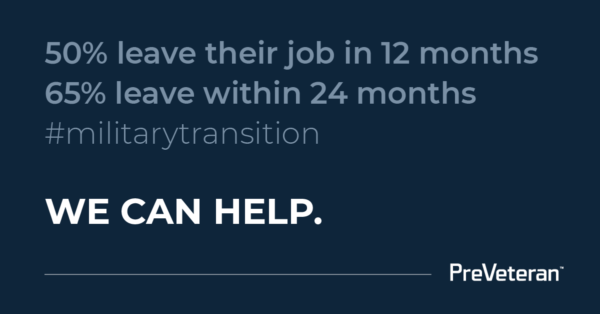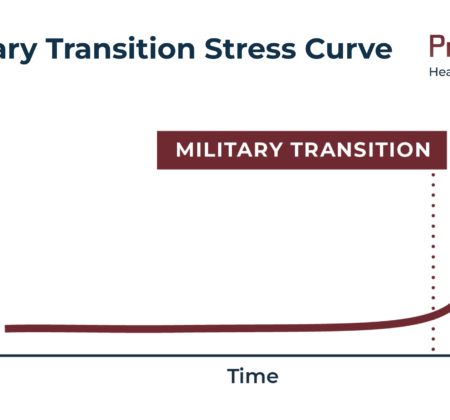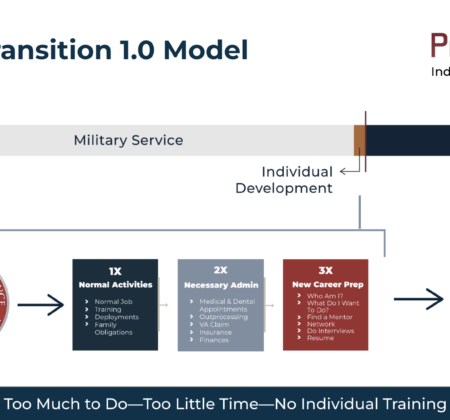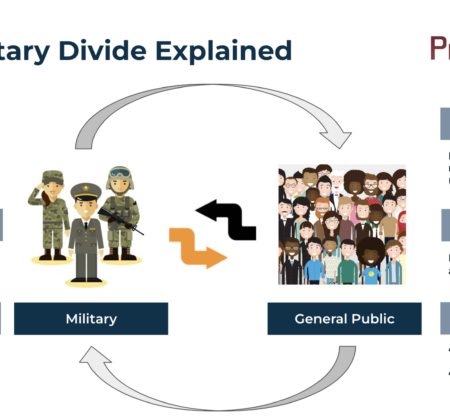If you are a military member who is starting to plan for your transition, you’re probably looking to social media for advice on what to do. Makes sense. Whether it’s LinkedIn or Facebook, there are veterans who have “been there, done that” and are sharing their personal stories in an effort to help you with your individual transition. Such stories seem particularly helpful if you are among the largest segment of the transitioning military population—those seeking employment. If you’ve been actively following these channels, you may be hearing the following advice as veterans share their personal stories. I’m paraphrasing a bit but here is the gist.
“When you leave the military, you just need to get a job. Finding a job is important because you really don’t know what you want to do anyway and it will take time to adjust to your new non-military life.”
At first glance the advice seems sound and makes sense. After all, we all know that making the transition from the military is a challenging one. Whether you’ve been in the military four years or forty years, you’ve seen your fair share of challenges. No matter what your job is (or was) in the military, you played your part in helping your unit carry out complex missions in challenging and often ambiguous environments.
In fact, in playing your part, you not only performed your primary job but also had numerous additional duties that you performed to the best of your ability—even if you had no prior experience with those tasks. You go where the unit needs you. You do what needs to be done. The mission is too important to act otherwise.
With these military-related work experiences firmly in your mind, it’s easy to think that those experiences will seamlessly carry over to your post-military employment. Despite how commonsensical this logic appears on the surface, it represents a mindset that is not productive for you as an individual or for veterans at large. To highlight this point, let’s look at this mindset from two different perspectives—the individual perspective and the employer perspective.
Individual Perspective
As you approach the end of your military career, at some point the reality begins to sink in: you are leaving a very homogenous military population and returning to being an individual within the much larger general public.
That is a big change but nothing you haven’t done before, right? For years, as a member of your military team, you’ve gone where the unit needs you. You’ve done what needs to get done. So, it should be no surprise that when you think about finding employment after your military service, you weigh being a “generalist” and “leader” high on your list of attributes.
As time goes on and you get closer to your departure from the military, you may get more stressed. All of a sudden, instead of being excited about your future, you become concerned about what you are going to lose. Pay on the 1st and 15th of the month. Free medical and dental care. And the list goes on. The phrase “As long as I replace my lost income” begins to percolate in your mind as a desired salary starting point. For those of you retiring, you may even be willing to accept less because you will be getting a monthly pension.
Now you are on terminal leave and haven’t secured a job, despite having looked for months and submitted dozens of applications to prospective employers. You may start thinking to yourself that those veterans telling their personal stories are right. “Maybe I do need to just get a job and figure it out from there.” With your income either gone altogether for those who separated, or significantly reduced for those who retired, you begin to look for any job you can find because the pressure is so intense.
Employer Perspective
Employers see things from a completely different perspective. For them, veterans simply represent another talent pool to draw from to meet their unique business needs. And, as such, they look at us veterans in the aggregate. And that individual mindset of “just get a job” we discussed in the previous section comes at a price for their company.

Here is some data about the talent life cycle that supports this assertion. First, employers spend money to get talent into the company. The amount of money depends on the role, but for medium- to large-size companies, the average cost per hire is about $4,000. From an individual perspective, that may not sound like much. However, from the employers’ perspective, if you multiply that $4,000 by the 100 roles that need to be filled, the cost to the company is $400,000.
And that’s just getting you in the door. After they hire you, they place significant investment in onboarding you and giving you additional training to be sure you are productive as early as possible in your role.
Which leads me to my next point—when you leave the company. Because of that additional investment needed to get you up and running after you are in the door, data indicates that to replace you when you leave the company will cost between 50% and 200% of an annual salary.
So, from an employer’s perspective, think about the impact that the “just get a job” mindset has on you—and our entire veteran population in the aggregate. While many companies continue to show a strong interest in hiring transitioning military, this interest may dwindle as employers begin pivoting to other talent pools that meet their needs and have better retention rates.
PreVeteran—Getting You Ready for Military Transition Earlier
The current mindset of “just get a job” is caused by a lack of individualized preparation and support before you leave the military. Without an individualized plan, you are left to deal with a wide range of unknowns, such as:
- What do I really want to do after the military?
- What does an employer really want?
- How do I address these unknowns?
Left unaddressed, these unknowns can fester and lead to those poor transition outcomes discussed in our earlier article titled The Elephant in the Room: The Two Years Following Military Transition Are the Most Problematic and Need to be Addressed.
We want you to know that it doesn’t have to be this way. Instead of leaving things to chance, make a different choice. Choose to be proactive in your military transition and align yourself with the private sector earlier.
For those of you who want to become employees, we created our 5-Week Employment Prep Pilot just for you. In this course, we address and help you overcome the multiple unknowns we know you face. By addressing and overcoming these unknowns, you will align yourself with the private sector much earlier, which will translate to you finding the job you want, one that meets your requirements and leads to much more successful outcomes.
Click here to reserve your slot.
Sources:
Society for Human Resource Management. “2016 Human Capital Benchmarking Report.” November 2016. https://www.shrm.org/hr-today/trends-and-forecasting/research-and-surveys/Documents/2016-Human-Capital-Report.pdf
Gallup. “This Fixable Problem Costs U.S. Businesses $1 Trillion.” March 13, 2019. https://www.gallup.com/workplace/247391/fixable-problem-costs-businesses-trillion


